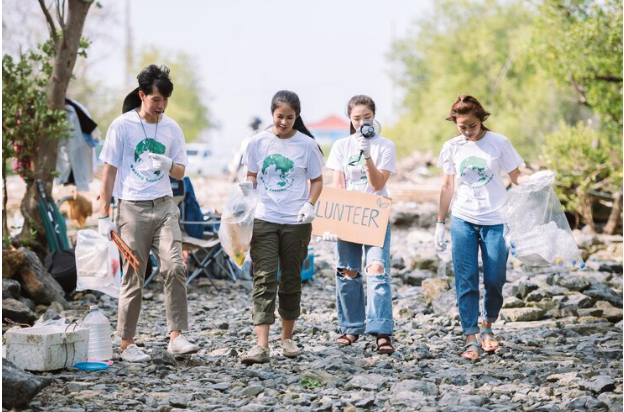foto: freepik.com
Brilio.net - The success of education in a country is not only due to teachers and a carefully prepared curriculum, but there is also a real contribution from volunteers in schools, although not all schools have volunteers.
Volunteers in schools have an important role in the world of education , because they help and provide experience for students who see and participate directly in becoming part of the volunteers at school.
All the experiences that volunteers have at school can have several positive impacts on students and the school. Examples include creating empowered learning communities, enriching educational experiences and preparing future generations for the challenges of an increasingly complex world.
Apart from that, examples of volunteers in schools are very diverse, such as volunteering for social activities, tree planting activities, teaching and learning for street children, or just donating books . That way, students and teachers are free to choose to volunteer in the field they want.
Compiled by brilio.net from various sources, Tuesday (27/2), the following are examples of volunteers in schools, complete with their understanding and benefits for the world of education.
Definition of volunteer.

photo: freepik.com
Volunteers in general are individuals who voluntarily carry out social actions or activities without expecting material rewards. They are willing to give their time, energy and expertise to help others or contribute themselves for the benefit of society.
In schools, volunteers can be defined as students or teachers who voluntarily engage in social or humanitarian activities to help others selflessly. They can be involved in various activities such as raising funds for victims of natural disasters, visiting social institutions, or teaching disadvantaged children.
Social and humanitarian activities at school not only help improve the conditions of the surrounding community, but also provide a forum for students to learn about empathy, caring and a sense of responsibility towards others.
Benefits of volunteering at school.

photo: freepik.com
There are many benefits to volunteering at school. Moreover, if you volunteer in social activities. Through various social and humanitarian activities, students at school have great potential to build empathy and a sense of caring for others. Activities such as fundraising for underprivileged children, visits to nursing homes, or participation in volunteer programs can be a place for students to learn about empathy and humanity.
Through involvement in these social activities, students can understand how important it is to help each other and care for each other. Apart from that, they will also learn to appreciate what they already have and feel inner satisfaction when they can provide help to others.
Not only for students, volunteer activities also provide great benefits for the world of education. By being involved in humanitarian activities, students can develop social and leadership skills, expand social networks, and build good character.
This not only has a positive impact on students' personal development, but also makes a positive contribution to the school environment and society at large. Thus, volunteer activities can be an effective means of building student character and learning human values at school.
Examples of volunteers at school.

photo: freepik.com
1. Mentoring or tutoring.
Students who have good academic abilities can volunteer as mentors or tutors for students who need additional help in certain subjects. They can help in providing material, solving problems, and providing motivation to students who need it.
2. School library management.
Volunteers can help in managing the school library, including arranging books, assisting students in searching for books, and supervising book borrowing and returning activities. This helps improve the accessibility and sustainability of school libraries.
3. School environment activities.
Volunteers can be involved in school environmental activities such as cleaning the school yard, planting trees, or maintaining the school garden. This helps in creating a clean, green and enjoyable school environment for learning.
4. Guidance and counseling program.
Volunteers trained in psychology or counseling can help in organizing guidance and counseling programs in schools. They can provide individual or group counseling sessions, as well as conduct seminars or workshops on relevant topics.
5. Development of skills and hobbies.
Volunteers who have certain skills or hobbies such as art, music, or sports can help organize extracurricular activities or clubs at school. They can teach students about those skills or hobbies and help in developing students' interests and talents.
6. Teach to parents or the local community.
Apart from teaching within the school environment, volunteering can also provide education outside the school, such as teaching parents and local communities or the surrounding environment who do not have access to education.
7. Raise funds for education.
Not only teaching, volunteers can also raise funds aimed at education. This fundraising can be done anywhere, especially in the school environment, this helps students to be more empathetic and care about each other.
8. Hold training for teachers.
Training for teachers can take the form of anything, such as seminars, workshops, or other training outreach. This training aims to improve the quality and quality of teaching of teachers which will have an impact on students.
9. Contribute learning materials.
Volunteering can also provide physical assistance in the form of learning materials. Volunteers can donate used textbooks or educational modules to give to schools or communities that have little access to textbooks.
10. Teaching specific languages and skills.
By teaching specific languages and skills, volunteers help students develop their talents and skills in areas they love. Not only is it a place for them to develop, this activity is also a bridge for them to catch up on the gaps they experience in the fields of arts and culture.
(brl/jad)